BUSI 440: Compensation Structure Report for Food Industry Analysis
VerifiedAdded on 2022/10/04
|9
|1721
|212
Report
AI Summary
This report, created for Liberty University's BUSI 440 course, presents a detailed compensation structure analysis for the food industry. It begins with job descriptions for roles including Chef, Food Scientist, Dietitian, and Restaurant Manager, outlining their duties, skills, and qualifications. The core of the report focuses on compensable factors such as experience, competencies, and supervision exercised, and how these should influence compensation. The report also discusses the benefits that should be available to employees in these roles, such as health insurance, retirement benefits, and paid time off, integrating biblical principles to support the recommendations. The Hay Plan Point Method approach is used. The report references multiple scholarly sources to support its findings and recommendations, offering a comprehensive overview of effective compensation strategies within the food industry. It builds upon the foundation established in Deliverable I, which involved a wage survey and industry research.
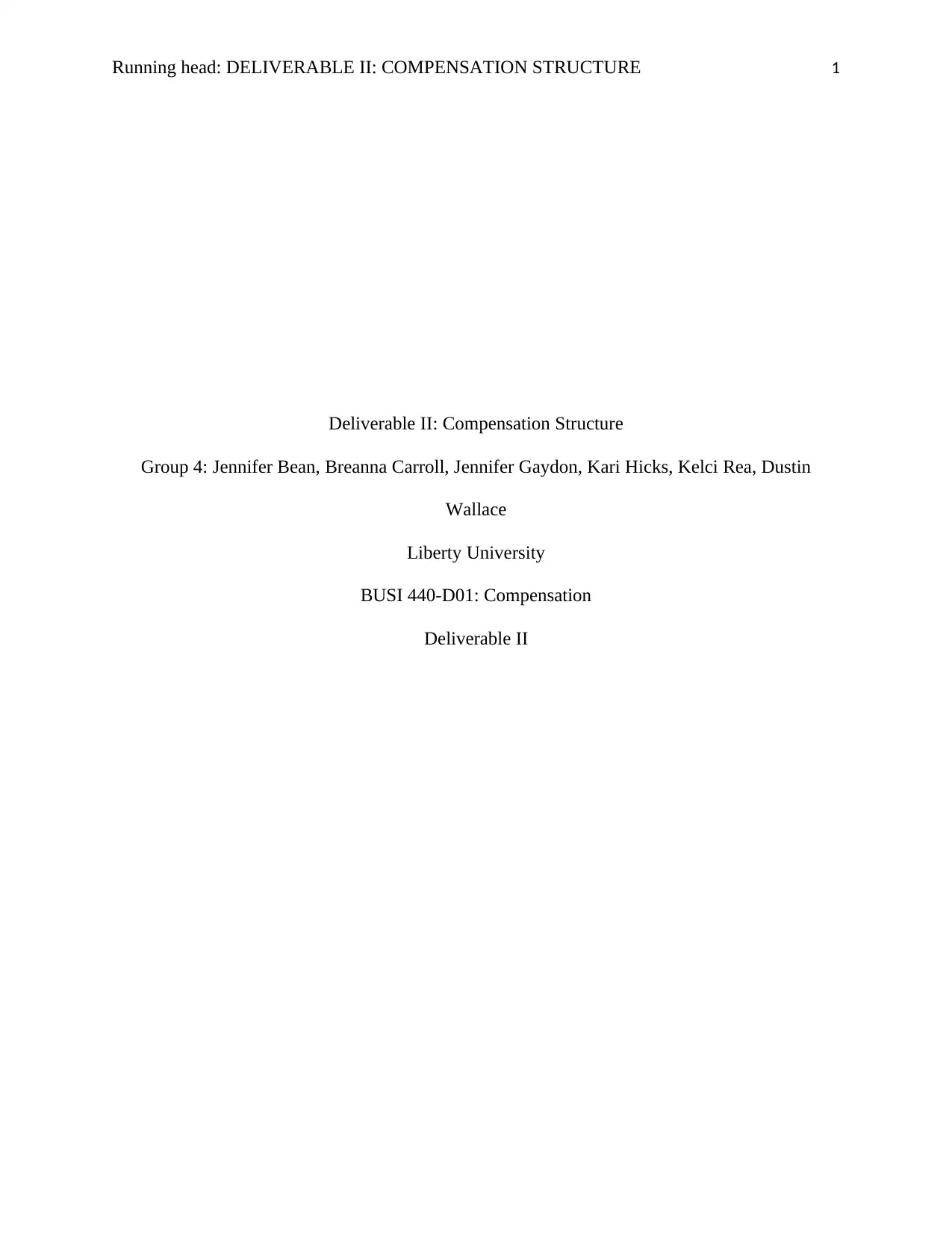
Running head: DELIVERABLE II: COMPENSATION STRUCTURE 1
Deliverable II: Compensation Structure
Group 4: Jennifer Bean, Breanna Carroll, Jennifer Gaydon, Kari Hicks, Kelci Rea, Dustin
Wallace
Liberty University
BUSI 440-D01: Compensation
Deliverable II
Deliverable II: Compensation Structure
Group 4: Jennifer Bean, Breanna Carroll, Jennifer Gaydon, Kari Hicks, Kelci Rea, Dustin
Wallace
Liberty University
BUSI 440-D01: Compensation
Deliverable II
Paraphrase This Document
Need a fresh take? Get an instant paraphrase of this document with our AI Paraphraser
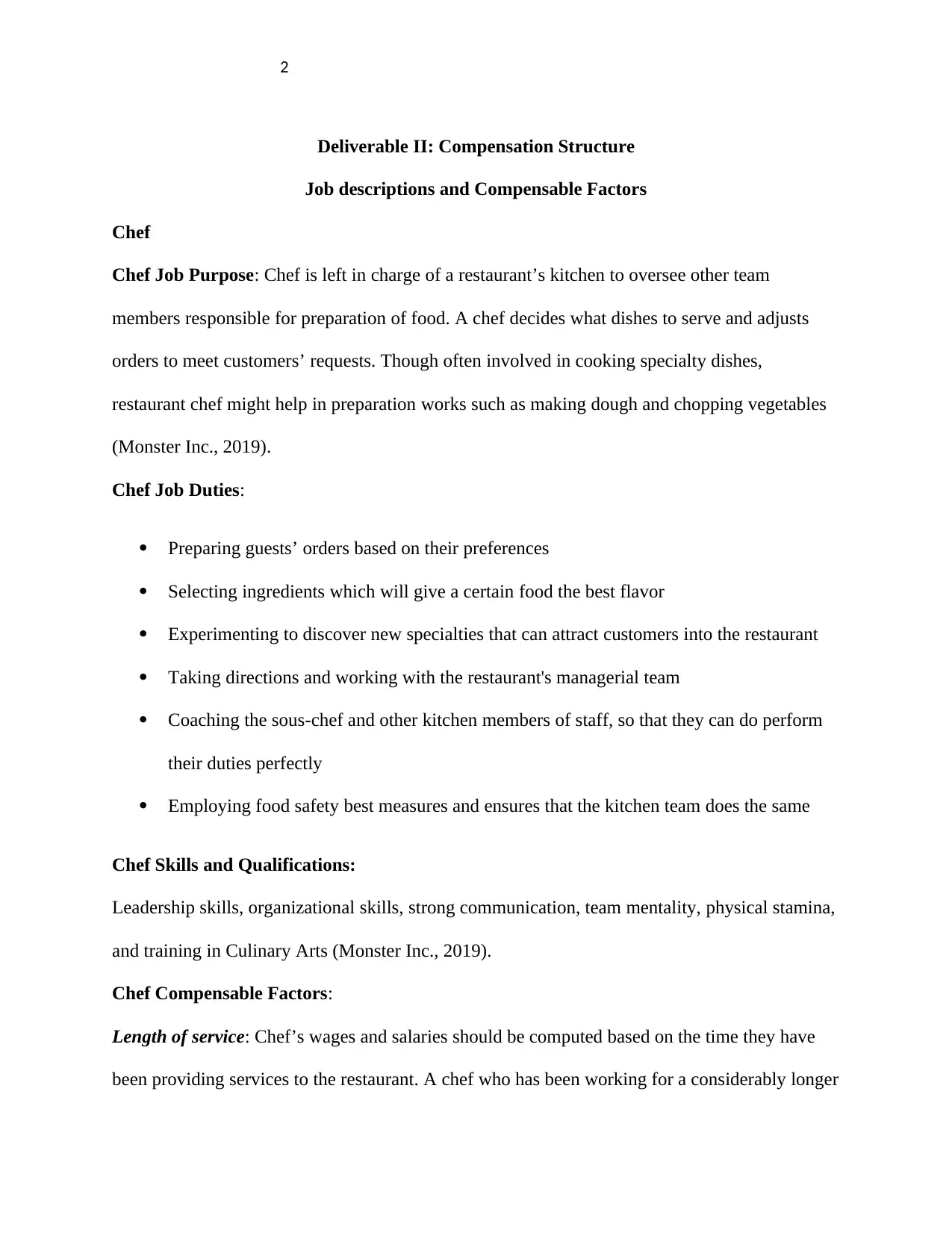
2
Deliverable II: Compensation Structure
Job descriptions and Compensable Factors
Chef
Chef Job Purpose: Chef is left in charge of a restaurant’s kitchen to oversee other team
members responsible for preparation of food. A chef decides what dishes to serve and adjusts
orders to meet customers’ requests. Though often involved in cooking specialty dishes,
restaurant chef might help in preparation works such as making dough and chopping vegetables
(Monster Inc., 2019).
Chef Job Duties:
Preparing guests’ orders based on their preferences
Selecting ingredients which will give a certain food the best flavor
Experimenting to discover new specialties that can attract customers into the restaurant
Taking directions and working with the restaurant's managerial team
Coaching the sous-chef and other kitchen members of staff, so that they can do perform
their duties perfectly
Employing food safety best measures and ensures that the kitchen team does the same
Chef Skills and Qualifications:
Leadership skills, organizational skills, strong communication, team mentality, physical stamina,
and training in Culinary Arts (Monster Inc., 2019).
Chef Compensable Factors:
Length of service: Chef’s wages and salaries should be computed based on the time they have
been providing services to the restaurant. A chef who has been working for a considerably longer
Deliverable II: Compensation Structure
Job descriptions and Compensable Factors
Chef
Chef Job Purpose: Chef is left in charge of a restaurant’s kitchen to oversee other team
members responsible for preparation of food. A chef decides what dishes to serve and adjusts
orders to meet customers’ requests. Though often involved in cooking specialty dishes,
restaurant chef might help in preparation works such as making dough and chopping vegetables
(Monster Inc., 2019).
Chef Job Duties:
Preparing guests’ orders based on their preferences
Selecting ingredients which will give a certain food the best flavor
Experimenting to discover new specialties that can attract customers into the restaurant
Taking directions and working with the restaurant's managerial team
Coaching the sous-chef and other kitchen members of staff, so that they can do perform
their duties perfectly
Employing food safety best measures and ensures that the kitchen team does the same
Chef Skills and Qualifications:
Leadership skills, organizational skills, strong communication, team mentality, physical stamina,
and training in Culinary Arts (Monster Inc., 2019).
Chef Compensable Factors:
Length of service: Chef’s wages and salaries should be computed based on the time they have
been providing services to the restaurant. A chef who has been working for a considerably longer
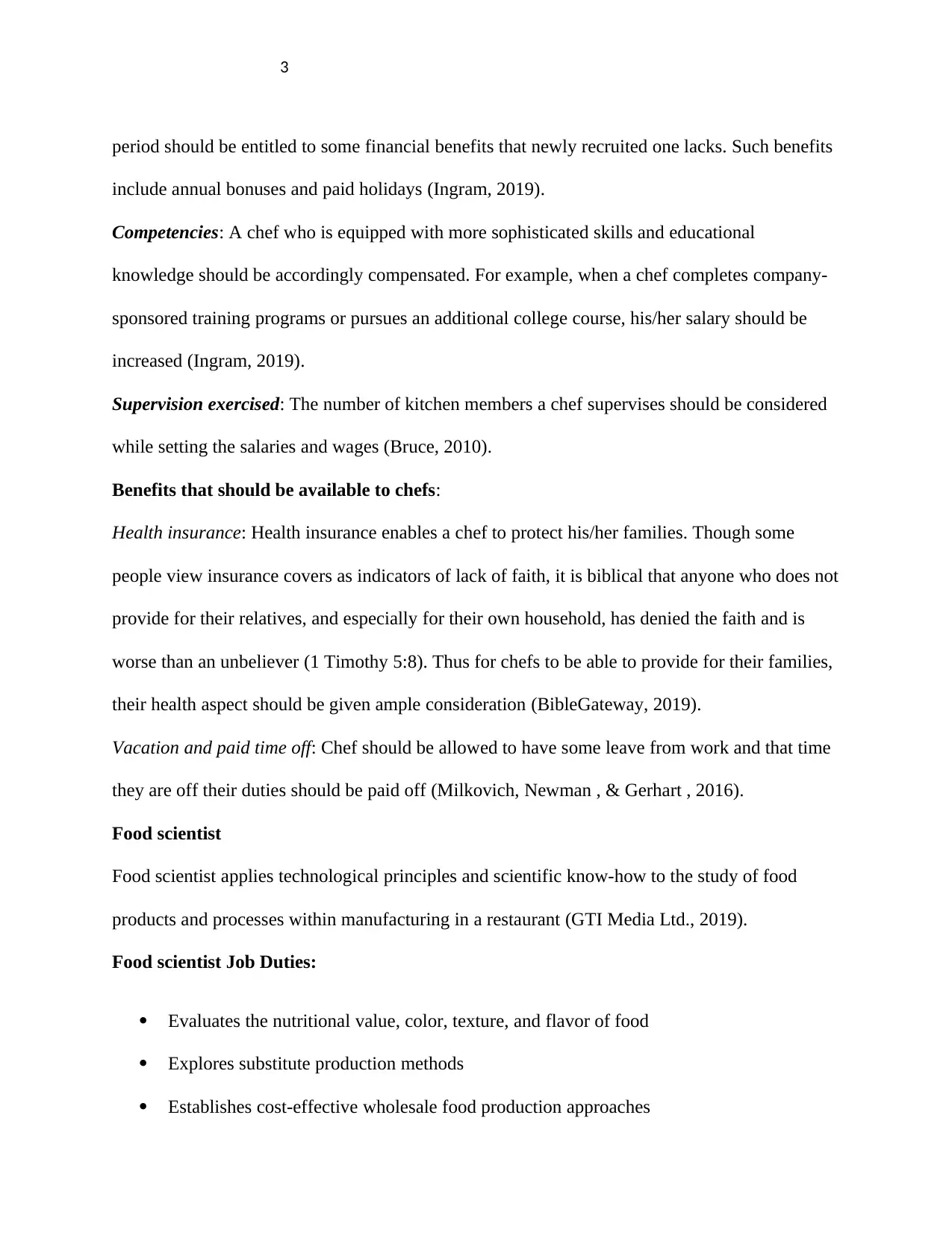
3
period should be entitled to some financial benefits that newly recruited one lacks. Such benefits
include annual bonuses and paid holidays (Ingram, 2019).
Competencies: A chef who is equipped with more sophisticated skills and educational
knowledge should be accordingly compensated. For example, when a chef completes company-
sponsored training programs or pursues an additional college course, his/her salary should be
increased (Ingram, 2019).
Supervision exercised: The number of kitchen members a chef supervises should be considered
while setting the salaries and wages (Bruce, 2010).
Benefits that should be available to chefs:
Health insurance: Health insurance enables a chef to protect his/her families. Though some
people view insurance covers as indicators of lack of faith, it is biblical that anyone who does not
provide for their relatives, and especially for their own household, has denied the faith and is
worse than an unbeliever (1 Timothy 5:8). Thus for chefs to be able to provide for their families,
their health aspect should be given ample consideration (BibleGateway, 2019).
Vacation and paid time off: Chef should be allowed to have some leave from work and that time
they are off their duties should be paid off (Milkovich, Newman , & Gerhart , 2016).
Food scientist
Food scientist applies technological principles and scientific know-how to the study of food
products and processes within manufacturing in a restaurant (GTI Media Ltd., 2019).
Food scientist Job Duties:
Evaluates the nutritional value, color, texture, and flavor of food
Explores substitute production methods
Establishes cost-effective wholesale food production approaches
period should be entitled to some financial benefits that newly recruited one lacks. Such benefits
include annual bonuses and paid holidays (Ingram, 2019).
Competencies: A chef who is equipped with more sophisticated skills and educational
knowledge should be accordingly compensated. For example, when a chef completes company-
sponsored training programs or pursues an additional college course, his/her salary should be
increased (Ingram, 2019).
Supervision exercised: The number of kitchen members a chef supervises should be considered
while setting the salaries and wages (Bruce, 2010).
Benefits that should be available to chefs:
Health insurance: Health insurance enables a chef to protect his/her families. Though some
people view insurance covers as indicators of lack of faith, it is biblical that anyone who does not
provide for their relatives, and especially for their own household, has denied the faith and is
worse than an unbeliever (1 Timothy 5:8). Thus for chefs to be able to provide for their families,
their health aspect should be given ample consideration (BibleGateway, 2019).
Vacation and paid time off: Chef should be allowed to have some leave from work and that time
they are off their duties should be paid off (Milkovich, Newman , & Gerhart , 2016).
Food scientist
Food scientist applies technological principles and scientific know-how to the study of food
products and processes within manufacturing in a restaurant (GTI Media Ltd., 2019).
Food scientist Job Duties:
Evaluates the nutritional value, color, texture, and flavor of food
Explores substitute production methods
Establishes cost-effective wholesale food production approaches
⊘ This is a preview!⊘
Do you want full access?
Subscribe today to unlock all pages.

Trusted by 1+ million students worldwide
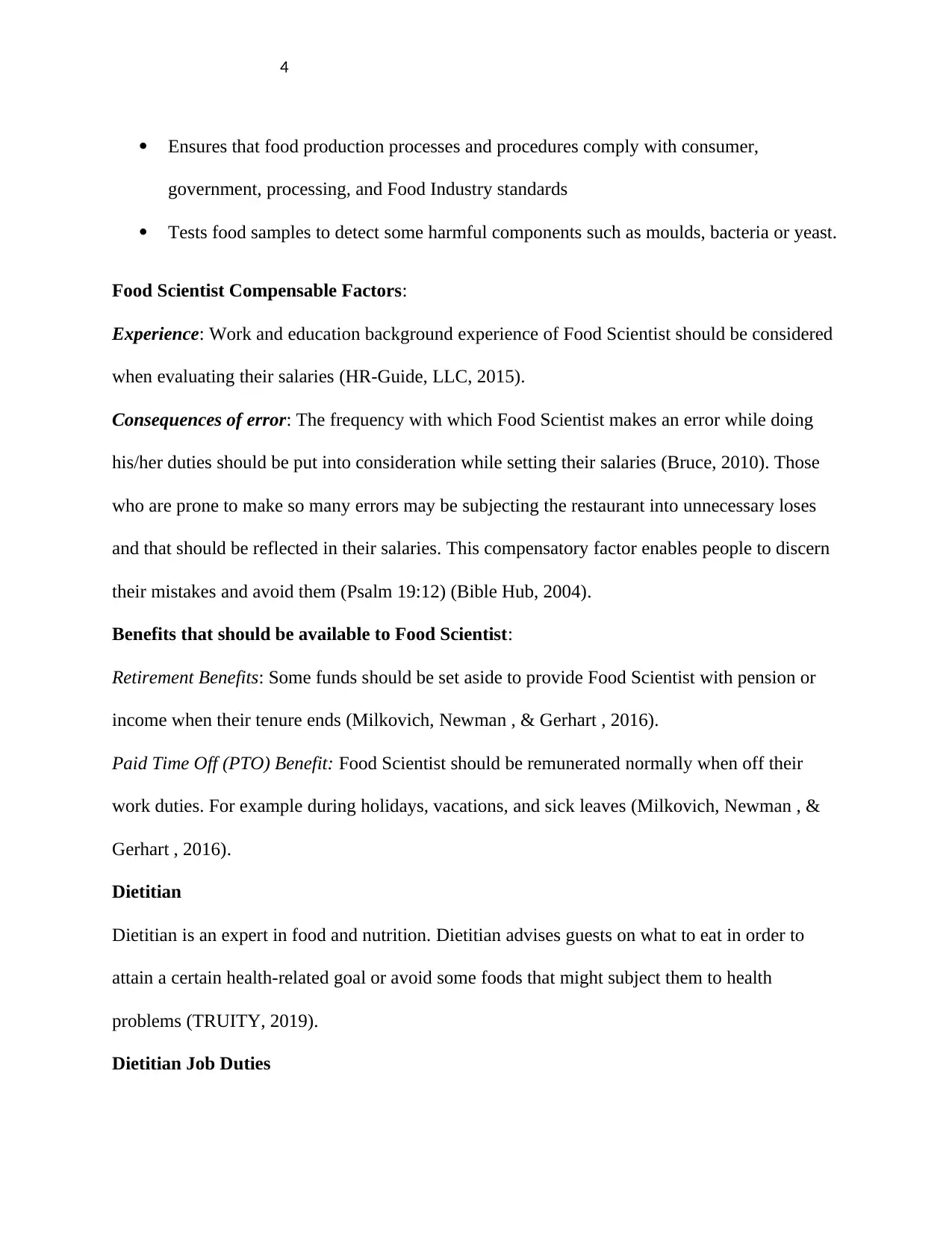
4
Ensures that food production processes and procedures comply with consumer,
government, processing, and Food Industry standards
Tests food samples to detect some harmful components such as moulds, bacteria or yeast.
Food Scientist Compensable Factors:
Experience: Work and education background experience of Food Scientist should be considered
when evaluating their salaries (HR-Guide, LLC, 2015).
Consequences of error: The frequency with which Food Scientist makes an error while doing
his/her duties should be put into consideration while setting their salaries (Bruce, 2010). Those
who are prone to make so many errors may be subjecting the restaurant into unnecessary loses
and that should be reflected in their salaries. This compensatory factor enables people to discern
their mistakes and avoid them (Psalm 19:12) (Bible Hub, 2004).
Benefits that should be available to Food Scientist:
Retirement Benefits: Some funds should be set aside to provide Food Scientist with pension or
income when their tenure ends (Milkovich, Newman , & Gerhart , 2016).
Paid Time Off (PTO) Benefit: Food Scientist should be remunerated normally when off their
work duties. For example during holidays, vacations, and sick leaves (Milkovich, Newman , &
Gerhart , 2016).
Dietitian
Dietitian is an expert in food and nutrition. Dietitian advises guests on what to eat in order to
attain a certain health-related goal or avoid some foods that might subject them to health
problems (TRUITY, 2019).
Dietitian Job Duties
Ensures that food production processes and procedures comply with consumer,
government, processing, and Food Industry standards
Tests food samples to detect some harmful components such as moulds, bacteria or yeast.
Food Scientist Compensable Factors:
Experience: Work and education background experience of Food Scientist should be considered
when evaluating their salaries (HR-Guide, LLC, 2015).
Consequences of error: The frequency with which Food Scientist makes an error while doing
his/her duties should be put into consideration while setting their salaries (Bruce, 2010). Those
who are prone to make so many errors may be subjecting the restaurant into unnecessary loses
and that should be reflected in their salaries. This compensatory factor enables people to discern
their mistakes and avoid them (Psalm 19:12) (Bible Hub, 2004).
Benefits that should be available to Food Scientist:
Retirement Benefits: Some funds should be set aside to provide Food Scientist with pension or
income when their tenure ends (Milkovich, Newman , & Gerhart , 2016).
Paid Time Off (PTO) Benefit: Food Scientist should be remunerated normally when off their
work duties. For example during holidays, vacations, and sick leaves (Milkovich, Newman , &
Gerhart , 2016).
Dietitian
Dietitian is an expert in food and nutrition. Dietitian advises guests on what to eat in order to
attain a certain health-related goal or avoid some foods that might subject them to health
problems (TRUITY, 2019).
Dietitian Job Duties
Paraphrase This Document
Need a fresh take? Get an instant paraphrase of this document with our AI Paraphraser
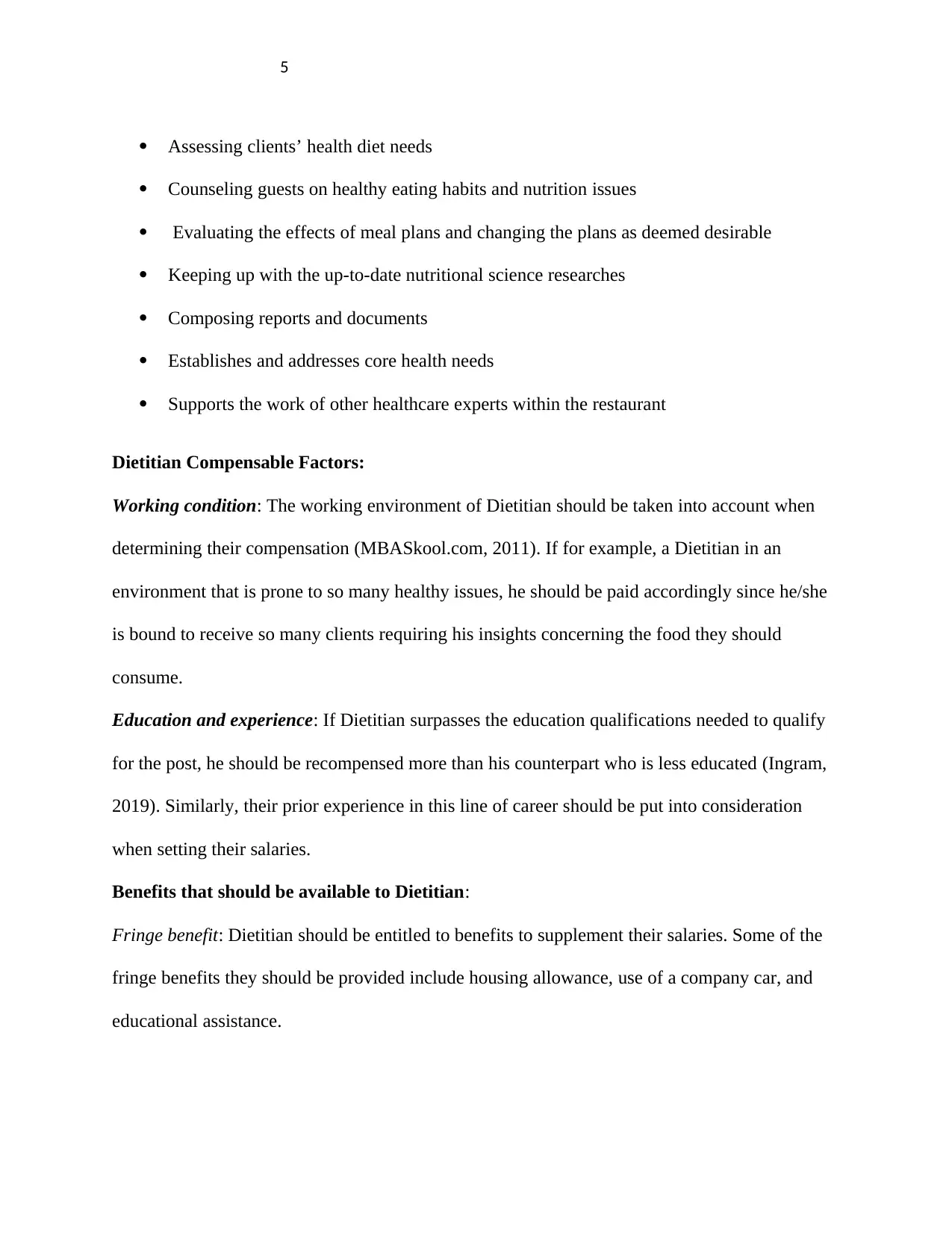
5
Assessing clients’ health diet needs
Counseling guests on healthy eating habits and nutrition issues
Evaluating the effects of meal plans and changing the plans as deemed desirable
Keeping up with the up-to-date nutritional science researches
Composing reports and documents
Establishes and addresses core health needs
Supports the work of other healthcare experts within the restaurant
Dietitian Compensable Factors:
Working condition: The working environment of Dietitian should be taken into account when
determining their compensation (MBASkool.com, 2011). If for example, a Dietitian in an
environment that is prone to so many healthy issues, he should be paid accordingly since he/she
is bound to receive so many clients requiring his insights concerning the food they should
consume.
Education and experience: If Dietitian surpasses the education qualifications needed to qualify
for the post, he should be recompensed more than his counterpart who is less educated (Ingram,
2019). Similarly, their prior experience in this line of career should be put into consideration
when setting their salaries.
Benefits that should be available to Dietitian:
Fringe benefit: Dietitian should be entitled to benefits to supplement their salaries. Some of the
fringe benefits they should be provided include housing allowance, use of a company car, and
educational assistance.
Assessing clients’ health diet needs
Counseling guests on healthy eating habits and nutrition issues
Evaluating the effects of meal plans and changing the plans as deemed desirable
Keeping up with the up-to-date nutritional science researches
Composing reports and documents
Establishes and addresses core health needs
Supports the work of other healthcare experts within the restaurant
Dietitian Compensable Factors:
Working condition: The working environment of Dietitian should be taken into account when
determining their compensation (MBASkool.com, 2011). If for example, a Dietitian in an
environment that is prone to so many healthy issues, he should be paid accordingly since he/she
is bound to receive so many clients requiring his insights concerning the food they should
consume.
Education and experience: If Dietitian surpasses the education qualifications needed to qualify
for the post, he should be recompensed more than his counterpart who is less educated (Ingram,
2019). Similarly, their prior experience in this line of career should be put into consideration
when setting their salaries.
Benefits that should be available to Dietitian:
Fringe benefit: Dietitian should be entitled to benefits to supplement their salaries. Some of the
fringe benefits they should be provided include housing allowance, use of a company car, and
educational assistance.
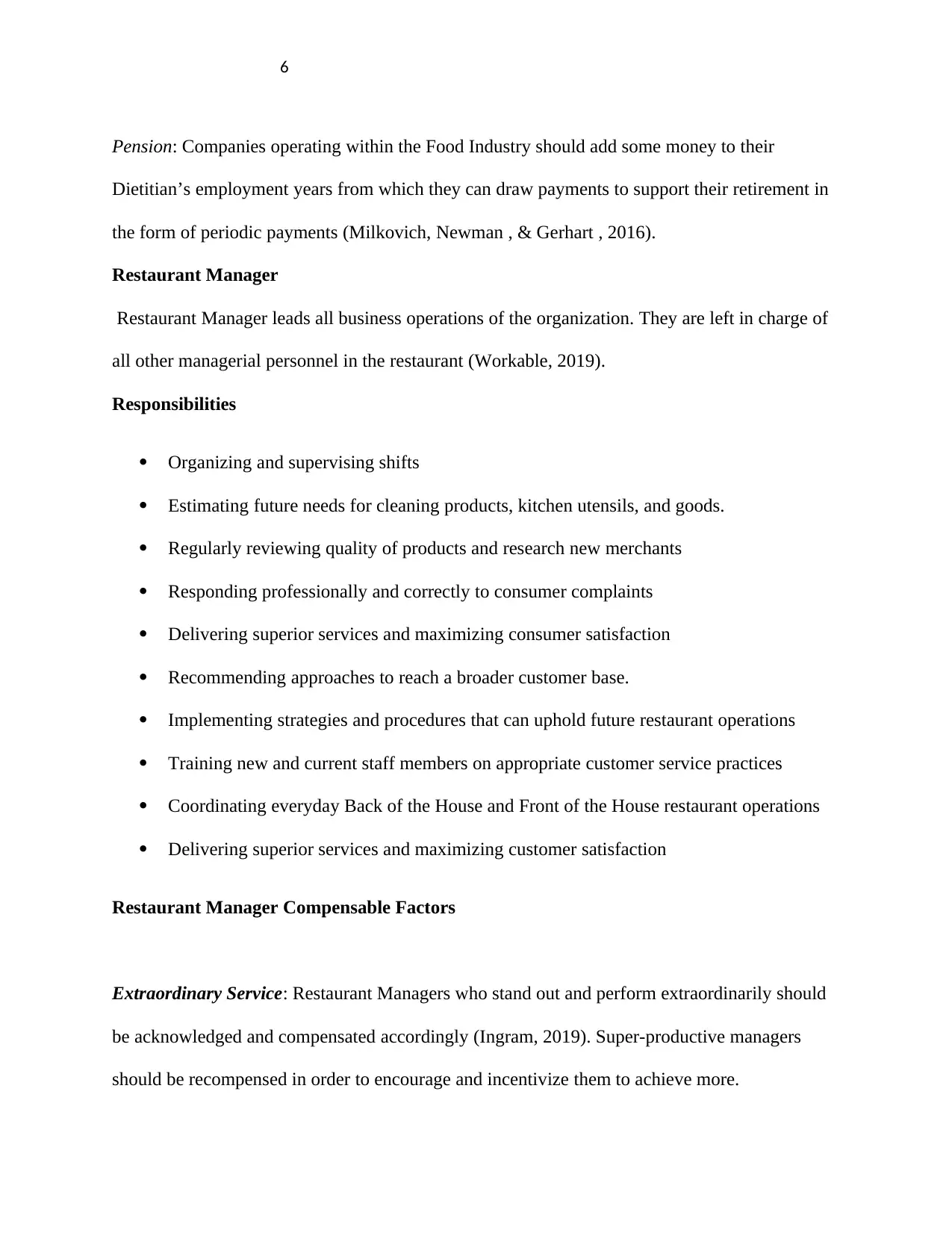
6
Pension: Companies operating within the Food Industry should add some money to their
Dietitian’s employment years from which they can draw payments to support their retirement in
the form of periodic payments (Milkovich, Newman , & Gerhart , 2016).
Restaurant Manager
Restaurant Manager leads all business operations of the organization. They are left in charge of
all other managerial personnel in the restaurant (Workable, 2019).
Responsibilities
Organizing and supervising shifts
Estimating future needs for cleaning products, kitchen utensils, and goods.
Regularly reviewing quality of products and research new merchants
Responding professionally and correctly to consumer complaints
Delivering superior services and maximizing consumer satisfaction
Recommending approaches to reach a broader customer base.
Implementing strategies and procedures that can uphold future restaurant operations
Training new and current staff members on appropriate customer service practices
Coordinating everyday Back of the House and Front of the House restaurant operations
Delivering superior services and maximizing customer satisfaction
Restaurant Manager Compensable Factors
Extraordinary Service: Restaurant Managers who stand out and perform extraordinarily should
be acknowledged and compensated accordingly (Ingram, 2019). Super-productive managers
should be recompensed in order to encourage and incentivize them to achieve more.
Pension: Companies operating within the Food Industry should add some money to their
Dietitian’s employment years from which they can draw payments to support their retirement in
the form of periodic payments (Milkovich, Newman , & Gerhart , 2016).
Restaurant Manager
Restaurant Manager leads all business operations of the organization. They are left in charge of
all other managerial personnel in the restaurant (Workable, 2019).
Responsibilities
Organizing and supervising shifts
Estimating future needs for cleaning products, kitchen utensils, and goods.
Regularly reviewing quality of products and research new merchants
Responding professionally and correctly to consumer complaints
Delivering superior services and maximizing consumer satisfaction
Recommending approaches to reach a broader customer base.
Implementing strategies and procedures that can uphold future restaurant operations
Training new and current staff members on appropriate customer service practices
Coordinating everyday Back of the House and Front of the House restaurant operations
Delivering superior services and maximizing customer satisfaction
Restaurant Manager Compensable Factors
Extraordinary Service: Restaurant Managers who stand out and perform extraordinarily should
be acknowledged and compensated accordingly (Ingram, 2019). Super-productive managers
should be recompensed in order to encourage and incentivize them to achieve more.
⊘ This is a preview!⊘
Do you want full access?
Subscribe today to unlock all pages.

Trusted by 1+ million students worldwide
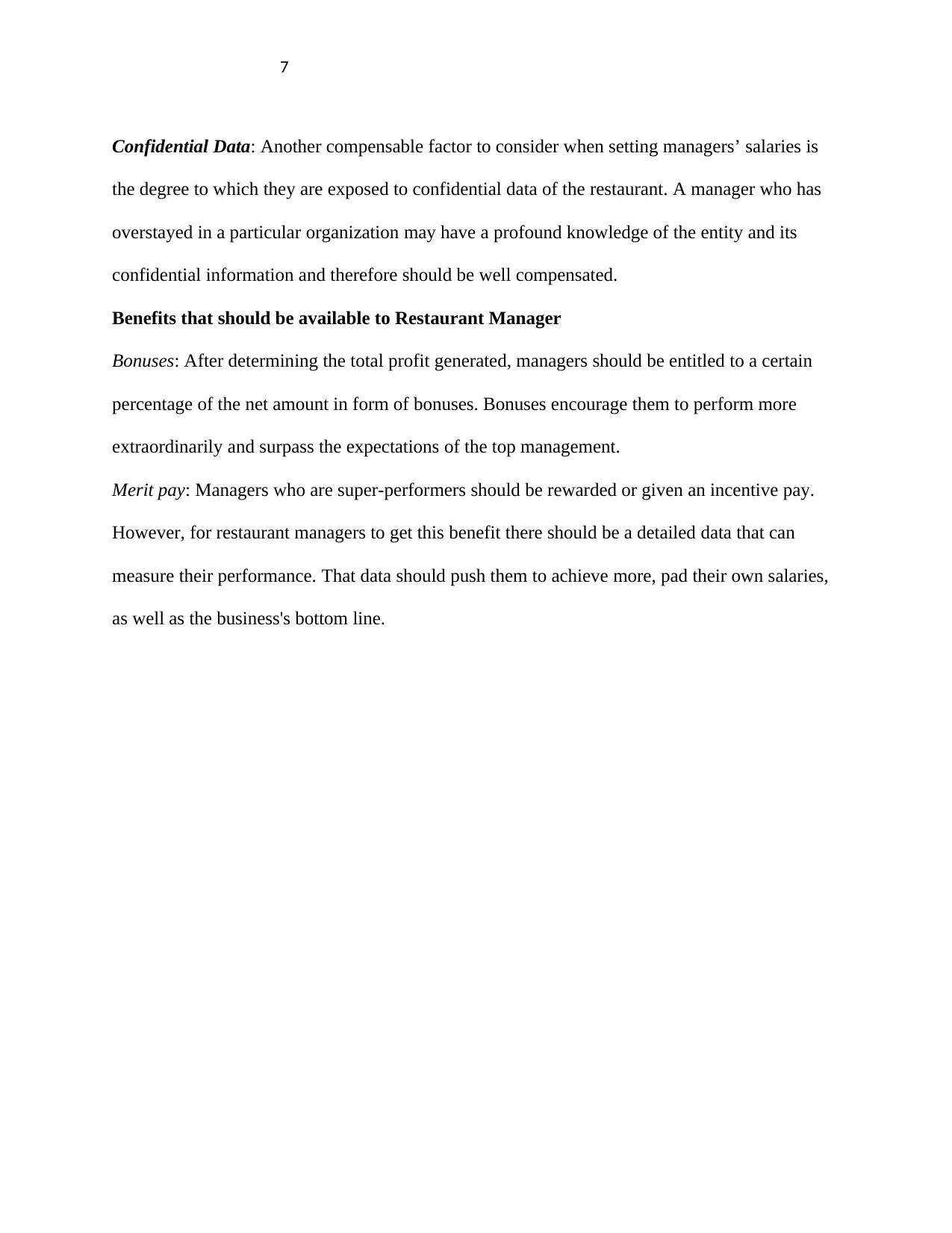
7
Confidential Data: Another compensable factor to consider when setting managers’ salaries is
the degree to which they are exposed to confidential data of the restaurant. A manager who has
overstayed in a particular organization may have a profound knowledge of the entity and its
confidential information and therefore should be well compensated.
Benefits that should be available to Restaurant Manager
Bonuses: After determining the total profit generated, managers should be entitled to a certain
percentage of the net amount in form of bonuses. Bonuses encourage them to perform more
extraordinarily and surpass the expectations of the top management.
Merit pay: Managers who are super-performers should be rewarded or given an incentive pay.
However, for restaurant managers to get this benefit there should be a detailed data that can
measure their performance. That data should push them to achieve more, pad their own salaries,
as well as the business's bottom line.
Confidential Data: Another compensable factor to consider when setting managers’ salaries is
the degree to which they are exposed to confidential data of the restaurant. A manager who has
overstayed in a particular organization may have a profound knowledge of the entity and its
confidential information and therefore should be well compensated.
Benefits that should be available to Restaurant Manager
Bonuses: After determining the total profit generated, managers should be entitled to a certain
percentage of the net amount in form of bonuses. Bonuses encourage them to perform more
extraordinarily and surpass the expectations of the top management.
Merit pay: Managers who are super-performers should be rewarded or given an incentive pay.
However, for restaurant managers to get this benefit there should be a detailed data that can
measure their performance. That data should push them to achieve more, pad their own salaries,
as well as the business's bottom line.
Paraphrase This Document
Need a fresh take? Get an instant paraphrase of this document with our AI Paraphraser
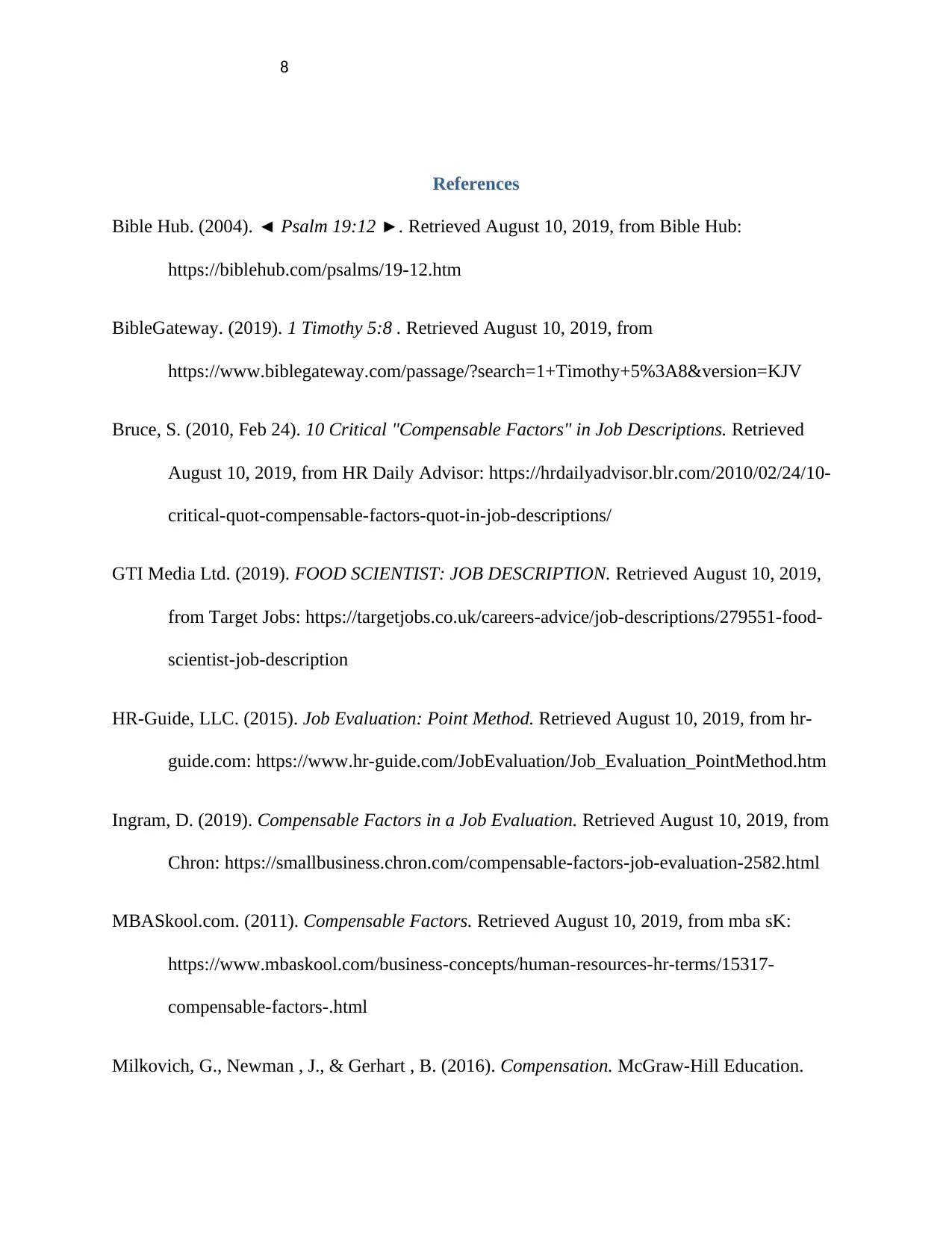
8
References
Bible Hub. (2004). ◄ Psalm 19:12 ►. Retrieved August 10, 2019, from Bible Hub:
https://biblehub.com/psalms/19-12.htm
BibleGateway. (2019). 1 Timothy 5:8 . Retrieved August 10, 2019, from
https://www.biblegateway.com/passage/?search=1+Timothy+5%3A8&version=KJV
Bruce, S. (2010, Feb 24). 10 Critical "Compensable Factors" in Job Descriptions. Retrieved
August 10, 2019, from HR Daily Advisor: https://hrdailyadvisor.blr.com/2010/02/24/10-
critical-quot-compensable-factors-quot-in-job-descriptions/
GTI Media Ltd. (2019). FOOD SCIENTIST: JOB DESCRIPTION. Retrieved August 10, 2019,
from Target Jobs: https://targetjobs.co.uk/careers-advice/job-descriptions/279551-food-
scientist-job-description
HR-Guide, LLC. (2015). Job Evaluation: Point Method. Retrieved August 10, 2019, from hr-
guide.com: https://www.hr-guide.com/JobEvaluation/Job_Evaluation_PointMethod.htm
Ingram, D. (2019). Compensable Factors in a Job Evaluation. Retrieved August 10, 2019, from
Chron: https://smallbusiness.chron.com/compensable-factors-job-evaluation-2582.html
MBASkool.com. (2011). Compensable Factors. Retrieved August 10, 2019, from mba sK:
https://www.mbaskool.com/business-concepts/human-resources-hr-terms/15317-
compensable-factors-.html
Milkovich, G., Newman , J., & Gerhart , B. (2016). Compensation. McGraw-Hill Education.
References
Bible Hub. (2004). ◄ Psalm 19:12 ►. Retrieved August 10, 2019, from Bible Hub:
https://biblehub.com/psalms/19-12.htm
BibleGateway. (2019). 1 Timothy 5:8 . Retrieved August 10, 2019, from
https://www.biblegateway.com/passage/?search=1+Timothy+5%3A8&version=KJV
Bruce, S. (2010, Feb 24). 10 Critical "Compensable Factors" in Job Descriptions. Retrieved
August 10, 2019, from HR Daily Advisor: https://hrdailyadvisor.blr.com/2010/02/24/10-
critical-quot-compensable-factors-quot-in-job-descriptions/
GTI Media Ltd. (2019). FOOD SCIENTIST: JOB DESCRIPTION. Retrieved August 10, 2019,
from Target Jobs: https://targetjobs.co.uk/careers-advice/job-descriptions/279551-food-
scientist-job-description
HR-Guide, LLC. (2015). Job Evaluation: Point Method. Retrieved August 10, 2019, from hr-
guide.com: https://www.hr-guide.com/JobEvaluation/Job_Evaluation_PointMethod.htm
Ingram, D. (2019). Compensable Factors in a Job Evaluation. Retrieved August 10, 2019, from
Chron: https://smallbusiness.chron.com/compensable-factors-job-evaluation-2582.html
MBASkool.com. (2011). Compensable Factors. Retrieved August 10, 2019, from mba sK:
https://www.mbaskool.com/business-concepts/human-resources-hr-terms/15317-
compensable-factors-.html
Milkovich, G., Newman , J., & Gerhart , B. (2016). Compensation. McGraw-Hill Education.
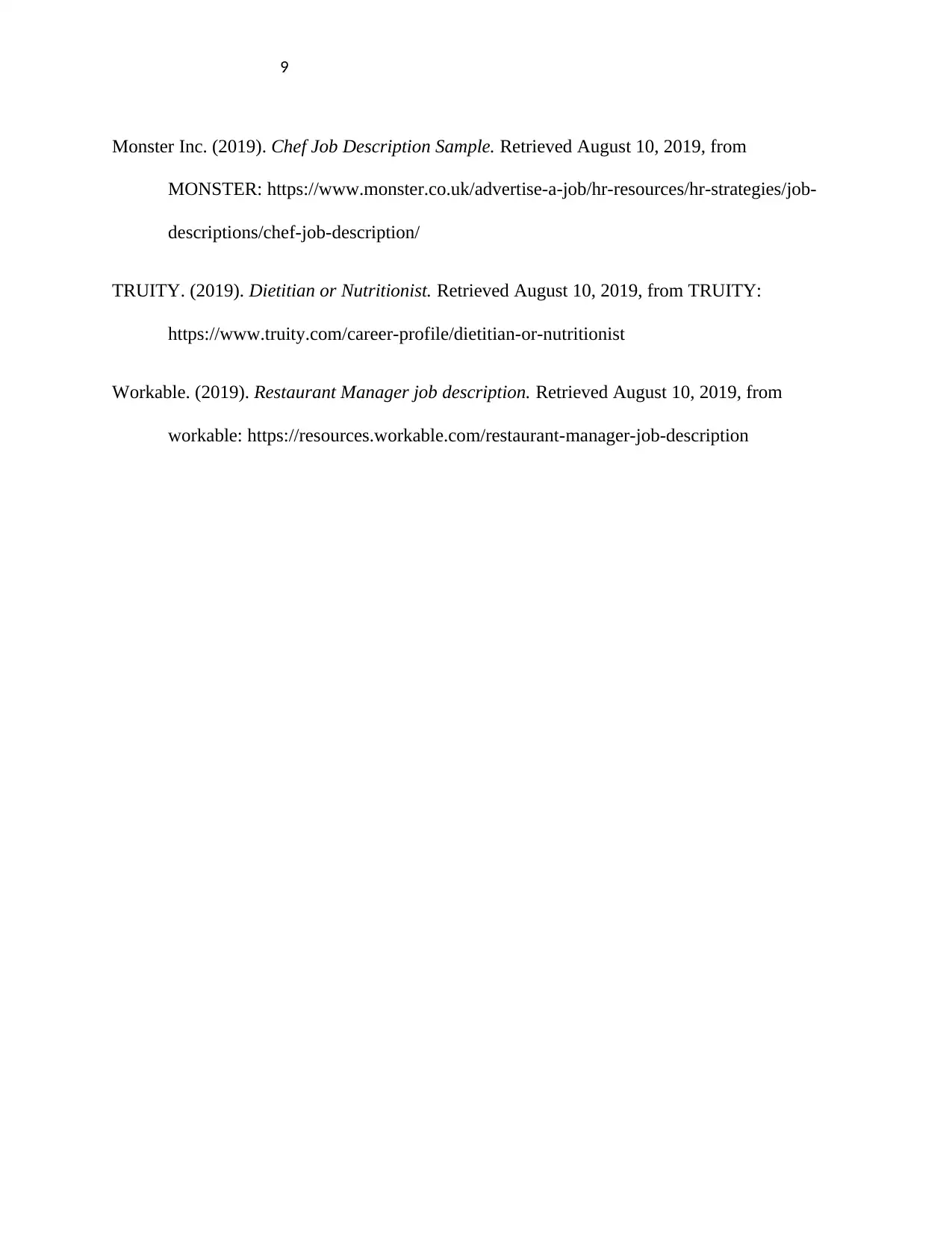
9
Monster Inc. (2019). Chef Job Description Sample. Retrieved August 10, 2019, from
MONSTER: https://www.monster.co.uk/advertise-a-job/hr-resources/hr-strategies/job-
descriptions/chef-job-description/
TRUITY. (2019). Dietitian or Nutritionist. Retrieved August 10, 2019, from TRUITY:
https://www.truity.com/career-profile/dietitian-or-nutritionist
Workable. (2019). Restaurant Manager job description. Retrieved August 10, 2019, from
workable: https://resources.workable.com/restaurant-manager-job-description
Monster Inc. (2019). Chef Job Description Sample. Retrieved August 10, 2019, from
MONSTER: https://www.monster.co.uk/advertise-a-job/hr-resources/hr-strategies/job-
descriptions/chef-job-description/
TRUITY. (2019). Dietitian or Nutritionist. Retrieved August 10, 2019, from TRUITY:
https://www.truity.com/career-profile/dietitian-or-nutritionist
Workable. (2019). Restaurant Manager job description. Retrieved August 10, 2019, from
workable: https://resources.workable.com/restaurant-manager-job-description
⊘ This is a preview!⊘
Do you want full access?
Subscribe today to unlock all pages.

Trusted by 1+ million students worldwide
1 out of 9
Your All-in-One AI-Powered Toolkit for Academic Success.
+13062052269
info@desklib.com
Available 24*7 on WhatsApp / Email
![[object Object]](/_next/static/media/star-bottom.7253800d.svg)
Unlock your academic potential
Copyright © 2020–2026 A2Z Services. All Rights Reserved. Developed and managed by ZUCOL.
